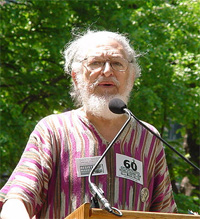
![African Writing Online Home Page [many literatures, one voice]](http://www.african-writing.com/nine/images/logo9.png)









![]()
A.
A. Waberi
A. Garriga-Lopez
Alex Smith
Arja Salafranca
Bashir A. Adan
Belinda Otas
Chika Unigwe
Chinua Achebe
Chuma Nwokolo
Damilola Ajayi
D
Nettleingham
Diana Evans
Don Mattera
Farouk O. Sesay
Laila Lalami
Lola Shoneyin
Maxim Uzoatu
Memory Chirere
Mukoma wa Ngugi
Mwila A. Zaza
N Brew-Hammond
Obiwu
Ovo Adagha
Peter W. Vakunta
Rose Francis
Sarah Manyika
T Mushakavanhu
Tola Ositelu
V Ehikhamenor
Zainabu Jallo
Zoe Norridge
![]()
 |
|||||||
Dennis Brutus, 1924 - 2009. Writer, Activist and Humanist
photocredit: Matthew Bradley |
|||||||
| A Sporting Chance | |||||||
Francis is publisher of African Perspectives Publishing, and chief executive of Rose Francis Communications, a Johannesburg-based communications company, which she founded in the early '80s.
|
|||||||
It was decades earlier though in 1909 that South Africa became the first country outside of Europe to become a FIFA member – before Argentina and Chile in 1912, and the United States in 1913. Forty-seven years later in 1956, the idea of an all-Africa tournament – an African Cup of Nations – was first proposed by Egypt. Why the African delegates invited a representative from South Africa, a country whose policies they disapproved of, to discuss what was a turning point not only in the history of the continent’s sport, but of Africa - is a mystery. But then in 1956 not many African nations were FIFA members and it was only Egypt, Sudan, Tunisia and Morocco that had gained political independence. Nineteen days after that historical meeting in Egypt, the Minister of Interior Dr Theophilus Ebenhaezer Donges declared that sport within the borders of South Africa had to be practised according to the principles of separate development. As a result, South Africa was compelled to withdraw from the first African Cup of Nations in 1957. During the 1958 FIFA World Cup in 1958, a decision was made to terminate South Africa’s membership from the continental body. This was also the year the football genius of Edison Arantes do Nascimento was introduced to the World as Pele. From this point, CAF was at the forefront of an international campaign to get South Africa expelled from all international sports bodies. The Sharpeville massacre of 1960 heightened international awareness of the political system in South Africa. The 1950’s saw a surge in resistance to segregated sport. One of the organisations formed in 1958 was the South African Sports Association (SASA) One of it’s patrons Alan Paton, writer of Cry the Beloved Country, said the object of SASA was to secure proper recognition for non –white sportsman and ‘to do this on a racial basis’. The South African government responded with repressive measures. Dennis Brutus, secretary of SASA and later President of SANROC (South African Non-Racial Olympic Committee), was refused a passport and served with stringent banning orders. He escaped to Mozambique in 1963 and tried to find a way to attend the IOC meeting, but the Portuguese colonial authorities handed him back to the South African government. He was shot in the stomach by the police in South Africa and later incarcerated on Robben Island. In prison he was forbidden to write poetry so he wrote letters instead. But Dennis’ use of poetry was not just an intellectual choice but rather a cry from the heart for social change.
Dennis’ poetic licence was inspired by the quest for restoration of human dignity and achievement. John Harris, chairman of SANROC, was also refused a passport, restricted and then detained. Utterly frustrated, he joined a white armed resistance movement and was executed in 1965. SANROC remained paralysed until it was revived in London in 1966. After being exiled from his homeland, Brutus became a prominent political organizer. In 1970 he led the successful campaign to expel apartheid South Africa from the Olympic Games. That it was becoming increasingly difficult to participate in sport in a country where racial discrimination was institutionalised is probably an understatement. The sports boycott made a great contribution not only to liberation, but also to the normalizing of everyday life. Sport was subject to a political dispensation that was determined to use every means at its disposal to prove that the racial premise on which it was based was justified. In a speech given in 1975 at the University of Texas on the question of literature and commitment in South Africa, Dennis said;
The
Politics of South African Football by Oshebeng Alphie Koonyaditse
is South Africa’s story of the road that lead to South Africa
hosting the FIFA 2010 World Cup and the people whose vehement resistance
and declaration that ‘there could be no normal sport in
an abnormal society’ proved a powerful antidote
to assurances by government that all was well. Dennis Brutus was
one of those many people. For this, I remain committed to telling
the World about the lives of those whose commitment and sacrifice
passed before. Those who decided - which side they were on. |
|||||||

